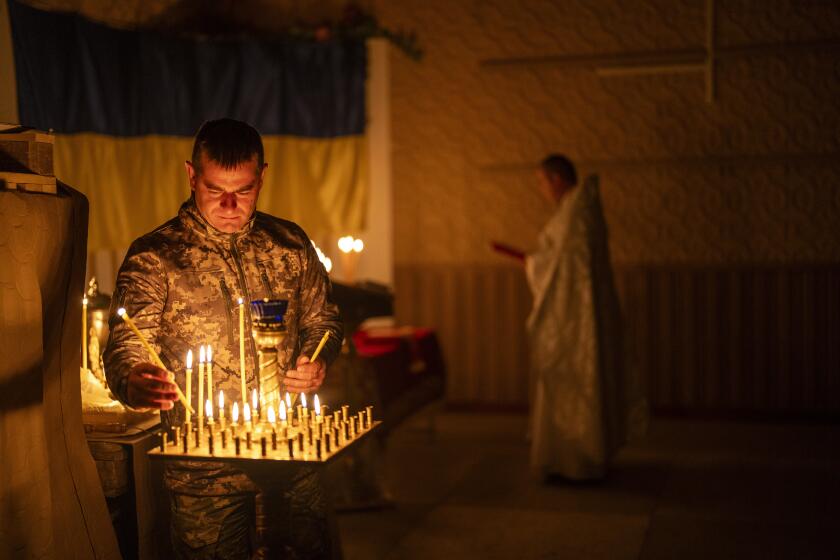PERSPECTIVE ON DESEGREGATION : Remembering a Kansas Childhood : Registering voters, working in the legislature--and not getting invited to slumber parties.
I grew up in Topeka, Kan., an unobtrusive, Midwestern town with a modest African American population of about 18,000. But 40 years ago today, the people I knew, the ones I saw with my parents, in our neighborhood or at church made history, with Brown vs. the Topeka Board of Education.
As a first-grader at Buchanan Elementary School, I had no idea of the significance of this Supreme Court decision in 1954. But two years later, when schools were forced to desegregate, it made a dramatic change in my life. Like an uninvited guest, it came with a crash when my new schoolmates asked me suspiciously why was I so tan. I soon learned the duality of integration during those early years.
My teacher was from western Kansas and like many of her students, had never met an African American. There begins a series of bittersweet contradictions. No matter how well or poorly I did, I always got a B. She would later explain to my mother that she didn’t know how to judge me in relationship to the white students. This tentativeness seeped into other relationships. Regardless of how much my white girlfriends seemed to like me, they could never invite me to their slumber parties. Yet whenever there was a special event or program, there was Sharon, a symbol of both tokenism and triumph.
Remembering those years, I now realize that I had some tremendous opportunities to balance the attacks on my self-esteem. Most memorable was meeting Dr. Carl Menninger, founder of the Menninger Clinic in Topeka, and being part of a pilot program with some of my white schoolmates. Maybe through osmosis, time with renowned psychiatrists helped give me coping skills.
My parents probably understood more than I realized about what I was going through, because they arranged for me to regularly spend time with my black friends. Both my mother and father kept me involved with organizations that are traditionally part of the African American infrastructure. I learned parliamentary procedures from Jack and Jill, social graces as a Bob-o-Link and spiritual lessons from St. John AME.
But the impression that has lasted throughout my life was seeing my parents’ commitment to the civil-rights struggle. I remember going with them to the black sections of Topeka, soliciting NAACP memberships and registering voters. I felt the bond of our African American community during those years of struggling for school desegregation. When I saw Oliver Brown at church, I was told that he was someone important, and so was his daughter Linda. But since she was several years older, I never knew her very well, and certainly didn’t realize they were the plaintiffs in a Supreme Court case.
Since my father was a lawyer, I grew up knowing the other local attorneys involved in the lawsuit and was raised in a household committed to civil rights, black businesses and the Republican Party. In junior high school, I was a page for the Kansas Legislature and babysat for the children of Alex Haley’s brother George, a state representative from Kansas City who had brought his youngsters to one of the sessions. Because Kansas was traditionally a one-party state, I knew only one black Democrat until I was in college.
Another anchor was Art Fletcher, the former chair of the U.S. Commission on Civil Rights, who was at Washburn University with my father. While in Los Angeles last year for hearings on the riots, he told me some incredible stories of what he and this group of young lawyers accomplished as Black Republicans in Kansas. He and my father organized a statewide black voting bloc that eventually created the commission.
Being grounded in a tradition of black pride helped balance some of the fear and anger I had to internalize in Topeka. I still carry vivid memories from when I was 5 and my mother was told that she and I couldn’t eat at the counter of the Woolworth’s downtown. When I was in junior high school, I remember when police dogs attacked our small group of youngsters leaving a Jack and Jill party, just because we were black.
These contradictions helped shaped my vision of who I was and what was going to be important to me. By 13, I knew I was going to be a journalist and change the world, because I had witnessed how my small African American community had made an unparalleled contribution to American history. And the anger from my early experiences with racism focused those dreams.
In 1970, my first year as the education reporter for the Ann Arbor News in Michigan, my father become the first black to serve on the Topeka Board of Education. Topeka wasn’t all jeweled slippers and yellow-brick roads, but it was home and a source of African American pride for me.
More to Read
Start your day right
Sign up for Essential California for news, features and recommendations from the L.A. Times and beyond in your inbox six days a week.
You may occasionally receive promotional content from the Los Angeles Times.






